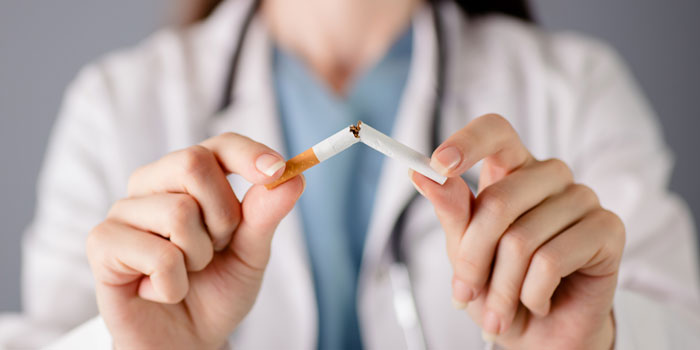
For many people, smoking and drinking go together like bacon and eggs. But when it comes to cancer risk, it’s more like “gasoline and matches,” says Stephen Lynch, MD, Primary Care and Intake Physician at City of Hope Phoenix.
Independently, alcohol and tobacco raise the risk for developing several types of cancer. In fact, tobacco alone is linked to a higher risk of 17 cancers, according to the National Cancer Institute. And excessive alcohol consumption is associated with an elevated risk for developing up to seven cancers, including breast cancer in women.
Combined, smoking and drinking significantly increase the risk for developing cancers in the aerodigestive tract—the lips, mouth, larynx, pharynx, throat, esophagus and colon.
In this article, we’ll explore:
- How does smoking cause cancer?
- Does alcohol cause cancer?
- How smoking and drinking may raise cancer risk
- How much is one drink of alcohol?
- Smoking and drinking by the numbers
- Smoking and drinking with cancer
- Quit to reducing cancer risk
If you smoke and/or drink alcohol and have been diagnosed with cancer, or would like a second opinion on your diagnosis and treatment plan, call us or chat online with a member of our team.
How does smoking cause cancer?
Each time a smoker inhales a lit cigarette, a chemical chain reaction creates dozens of carcinogenic compounds. These compounds are sucked through the lips, travel past the tongue and mouth, down the throat and into the lungs, causing inflammation in all those areas and exposing them to cancer-causing chemicals. Once in the lungs, compounds from the tobacco smoke are absorbed into the bloodstream and spread carcinogens throughout the body.
Tobacco smoking may cause cancer “almost anywhere in your body” and is linked to 90 percent of all lung cancers, according to the U.S. Centers for Diseases Control and Prevention (CDC). Lung cancer is the leading cause of all cancer deaths in America.
Smoking also is linked to:
- Bladder cancer
- Breast cancer
- Cervical cancer
- Colorectal cancer
- Esophageal cancer
- Head and neck cancer
- Kidney cancer
- Liver cancer
- Pancreatic cancer
Tobacco smoking is the leading cause of preventable disease and death in the United States, contributing to more than 480,000 deaths every year—from cancer, as well as heart disease, stroke and other causes, according to the CDC. Tobacco smoke damages not just DNA, but also the proteins in cells that repair DNA damage. Smoking also interferes with a process called metabolic detoxification, in which cells neutralize some toxins and flush them out of the body.
Learn more about how smoking causes cancer.
Does alcohol cause cancer?
Unlike tobacco use, which is risky in any amount, alcohol—when consumed in moderation—may not be harmful. In fact, moderate amounts of alcohol may help reduce the risk of stroke and cardiovascular disease for some people.
“Tobacco is the no-brainer,” Dr. Lynch says. “Everyone understands that now. But alcohol, because it does have some benefits with respect to cardiovascular risk reduction, people say it’s good for you.”
Moderate alcohol use is defined by the National Institutes of Health (NIH) and the American Heart Association as no more than two drinks a day for men and one drink a day for women.
Still, even moderate alcohol consumption may increase cancer risk in several ways, so it’s important to weigh the risks and benefits. Alcohol may:
- Cause inflammation in the liver and pancreas, raising the risk for developing cancer in those organs
- Produce ethanol, which metabolizes into a substance called acetaldehyde, which may stop cells from repairing DNA damage
- Damage healthy cells
- Increase estrogen production, which may increase cancer risk
- Weaken the body’s ability to breakdown and absorb nutrients
- Weaken the immune system
“Alcohol is a carcinogen,” Dr. Lynch says. “There really is no debate about that anymore. It is a cancer-causing agent, and the more you consume, the higher your risk.”
Learn more about how alcohol may cause cancer.
How smoking and drinking may raise cancer risk
Alcohol enhances the carcinogenic effects of tobacco in several ways. For example, it may increase the production of certain enzymes that convert tobacco tar—a chemical substance produced when tobacco is burned—into carcinogens.
Smoking and drinking combined may also compound the inflammation caused by each habit. “It’s not one plus one equals two,” Dr. Lynch says. “There's a much more exponential synergy when you combine alcohol and smoking.”
People who drink and smoke are 15 times more likely to develop cancer in the mouth and throat than nondrinkers and nonsmokers, according to the NIH.
Smoking and drinking by the numbers
In a study published by the NIAAA, researchers concluded that “dependence on alcohol and tobacco also is correlated.” They added: “People who are dependent on alcohol are three times more likely than those in the general population to be smokers, and people who are dependent on tobacco are four times more likely than the general population to be dependent on alcohol.”
According to the CDC and the NIAAA:
- 12.5 percent of American adults are smokers (14 percent of men and 11 percent of women).
- 70 percent of American smokers, more than 26 million people, also drink.
- Up to 95 percent of alcoholics are smokers.
- 70 percent of alcoholics are heavy smokers (more than one pack of cigarettes per day).
- 80 percent of throat and mouth cancer in men and 65 percent of throat and mouth cancer in women are linked to the combination of smoking and drinking.
Smoking and drinking among cancer patients
If you’ve been diagnosed with cancer but continue to smoke and drink, you may be hindering the effects of your cancer treatment. These habits may also worsen the symptoms of the disease and the side effects of treatment. Still, researchers found that two-thirds of cancer patients and survivors continue to smoke after their diagnosis.
Researchers at the University of Rochester concluded that cancer patients who smoke have a lower overall quality of life than non-smoking cancer patients. Smoking, cancer and cancer treatments put a tremendous burden on the body, and when combined, they may make it more difficult for the body to recover from treatment.
“A higher symptom burden can lead to interruptions in treatment, reductions in dosages, and delays in therapy,” the researchers wrote. “Treatment interruptions and dosage reduction can, in turn, compromise treatment efficacy, resulting in lower survival rates.”
According to the Office of the Surgeon General, smoking increases the failure rate of treatments for many types of cancer. Smoking may cause hypoxia (a lack of oxygen in the body or part of the body), which may produce poorer outcomes from radiation therapy and immunotherapy. Toxins in tobacco smoke may also affect how chemotherapy drugs are metabolized, potentially making them more toxic or less effective.
Alcohol may interact with certain cancer drugs, making them less effective. It may worsen the side effects of chemotherapy, increasing the risk of dehydration, nausea and other digestive issues.
“Alcohol abuse also complicates treatment outcomes among patients with cancer by contributing to longer hospitalizations, increased surgical procedures, prolonged recovery, higher health care costs and higher mortality,” the American Society of Clinical Oncology (ASCO) says in a statement on its website.

Quit to reduce cancer risk
Drinking and smoking may go hand in hand, for some people. That is, someone trying to quit smoking may slip when having a drink of alcohol, and vice versa. This is more common, too, in social settings when others around who are smoking and/or drinking.
“Studies show that consuming tobacco and alcohol together can augment the pleasure users experience from either drug alone,” NIAAA researchers concluded.
When recommending strategies for quitting, health experts approach tobacco and alcohol differently.
While suggesting alcohol cessation is best, the CDC suggests that those who choose to drink should do so only in moderation. Even so, some people should not drink alcohol at all, including:
- Women who are pregnant or may be pregnant
- Anyone younger than 21
- Those with specific medical conditions or who are on certain medications
- Alcoholics or those unable to control the amount they drink
But when it comes to smoking, even moderate tobacco use poses risks; every cigarette causes damage. Still, no matter how long you’ve smoked, it’s never too late to quit. The health benefits when you quit smoking are numerous, and they begin almost immediately after quitting and continue in the months and years that follow. Five to 10 years after quitting tobacco, a person’s risk for developing cancers of the larynx, oral cavity and pharynx drops by half, according to the CDC. Twenty years after kicking the habit, the risks drop to close to that of someone who does not smoke.
Quitting, though, is hard. Surveys show that most Americans who smoke want to quit, but most people who try fail several times before finally kicking the habit.
Strategies for smoking cessation, such as counseling, prescription drugs or nicotine replacement products, may not work for everyone. Ask your doctor or care team about the options available to help develop a personalized quitting plan that works best for you. Strategies may include:
- Nicotine replacement products
- Behavioral health strategies
- Prescription medications
- Respiratory therapy
And many online and community resources and support groups may be available to help you quit smoking. National quit smoking sites include:
If you smoke and/or drink alcohol and have been diagnosed with cancer, or would like a second opinion on your diagnosis and treatment plan, call us or chat online with a member of our team.





